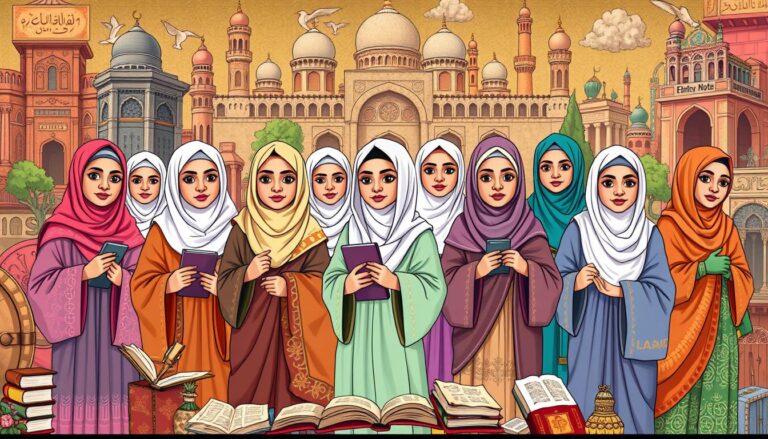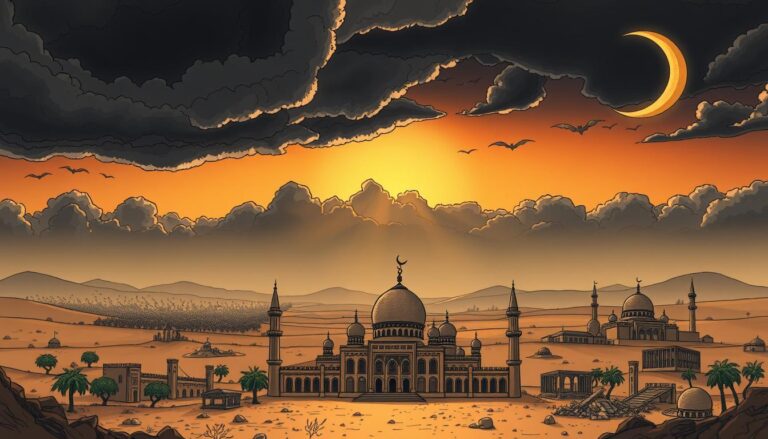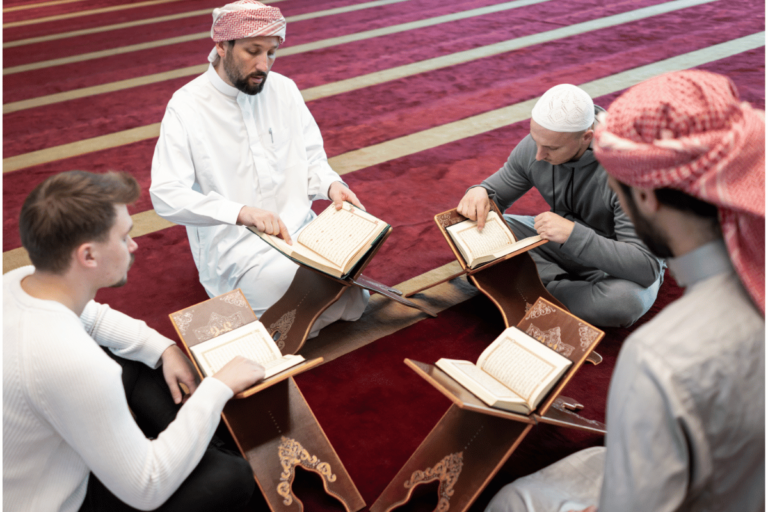Islamic Scholars Who Changed the World: The Untold Stories
Ever wondered about the hidden figures who shaped our world? The Islamic golden age, often ignored in Western history, was a time of great scientific and intellectual growth. It was here that brilliant Islamic scholars made contributions that still shape our lives today.
These thinkers worked in fields like astronomy, medicine, mathematics, and philosophy. They set the stage for many of our current scientific and cultural achievements. But their stories are often left untold, overshadowed by a Eurocentric view of history.
As we explore these stories, we’ll question the origins of modern knowledge. We’ll see how Islamic scholars connected ancient wisdom with today’s discoveries. This sparked a renaissance that spread to Europe and beyond.
Join us on a journey through time. We’ll uncover the amazing achievements of Muslim intellectuals who changed history. Their legacy, often hidden, deserves to be recognized in our global story of progress.
Key Takeaways
- Islamic scholars made significant contributions to various fields during the golden age.
- Their work laid the foundation for many modern scientific and cultural advancements.
- The Islamic golden age was a period of intense scientific revolution and intellectual growth.
- Western historical perspectives often overlook the contributions of these scholars.
- Recognizing these untold stories challenges our understanding of global intellectual history.
The Historical Significance of Islamic Scholarship
The Islamic golden age was a time of great change in history. From 570 to 632 CE, Arabia changed from a tribal society to a unified empire. Makkah became a center of commerce and religion, leading to big scientific and cultural wins.
The Golden Age of Islamic Science and Philosophy
Islamic scholars made huge strides in many areas. They were experts in desalination, falconry, and camel reproduction. By 900 CE, the Middle East was the heart of learning, encouraging new ideas and keeping knowledge alive.
Bridging Ancient Knowledge and Modern Discoveries
Islamic scholars were key in keeping and growing old wisdom. They translated many Greek texts, saving ancient knowledge. This exchange helped start the scientific breakthroughs of the future. Averroës, born in 1126 in Córdoba, Spain, wrote detailed notes on Aristotle’s works, linking ancient and Islamic thought.
Impact on Western Civilization
The effect of Islamic scholarship on Western civilization is huge. Even though Muslim countries’ science output has dropped, the Islamic golden age’s impact is still felt. The scientific revolution in Europe was built on the work of these brilliant minds.
“There can be no conflict between philosophy and faith.” – Averroës
Though Islamic science contributions have waned in recent years, the importance of Islamic scholarship is clear. It shows the value of keeping knowledge alive and sharing cultures in advancing human progress.
Al-Ghazali: The Reviver of Religious Sciences
Abu Hamid al-Ghazali was born in 1058 in Tus, Persia. He became a key figure in Islamic philosophy and Sufism. His work changed Islamic theology forever.
At 28, Al-Ghazali became the head of the Nizamiyah Madrasa in Baghdad. This early achievement started his spiritual journey.
His famous book, “The Revival of the Religious Sciences,” is a key Islamic text. It’s divided into four parts, covering faith, inner life, and society. It’s seen as the most important book in the Muslim world after the Quran.
“The Revival of the Religious Sciences is the greatest work of Muslim spirituality.”
Al-Ghazali’s work made him known as “Hujjat al-Islam” (the authority of Islam). He mixed orthodox Islamic teachings with Sufi mysticism. This made Sufism a big part of Islamic tradition.
Al-Ghazali’s legacy continues through his translated works. His ideas still shape Islamic theology, philosophy, and Sufism. He is remembered as a true reviver of religious sciences.
Ibn Khaldun: Father of Sociology and Historiography
Ibn Khaldun was born in 1332 in Tunis. He changed the way we think about sociology and historiography. His book, the Muqaddimah, was written in just six months. It’s the foundation of modern social sciences.
The Muqaddimah: A Groundbreaking Work
The Muqaddimah is Ibn Khaldun’s masterpiece. It explores why societies rise and fall. He looked at many factors, including theology and physics.
Theories on Social Cohesion and Civilization
Ibn Khaldun had theories on how societies change. He studied how they grow, thrive, and fall. His work is a key part of Arabic literature and is still valuable today.
Influence on Modern Social Sciences
Ibn Khaldun’s ideas are still important today. Scholars from Europe and America have used his work. Some see him as a pioneer of secularism, while others believe his ideas have religious roots.
“Historical sociology serves as a paradigm for analyzing human history and societal changes.”
Ibn Khaldun’s legacy is strong. His insights on society and history still guide us today. His work on social structures and patterns is crucial for understanding human societies.
Ibn Rushd (Averroes): The Great Commentator
Ibn Rushd, known as Averroes in the West, was a key figure in Islamic philosophy. He was born in Cordova in 1126. For 40 years, he made big contributions to many fields.
Averroes wrote detailed commentaries on Aristotle’s works. He wanted to get back to Aristotle’s true meaning. He also challenged Neoplatonic views, making people interested in Aristotle again.
His commentaries were divided into three types: short, middle, and long. Each offered a different level of analysis.
Ibn Rushd’s influence on Islamic philosophy was huge. He stood up for philosophy, saying it was okay within Islamic teachings. His medical book, Kitab al-Kulyat fi al-Tibb, was a key text for many years.
“The truth does not contradict the truth.”
But, Ibn Rushd faced challenges. In 1195, his works were officially rejected, leading to exile and book burnings. He went back to Cordoba just before he died in 1198. Yet, his writings found new fans in Christian and Jewish circles.
Now, scholars are trying to fix the broken view of Ibn Rushd’s work. They want to show his lasting impact on Islamic philosophy and Aristotle’s ideas.
Al-Biruni: The Universal Genius
Al-Biruni was a standout in the Islamic Golden Age. Born in 973 in Kath, Khwarezm, he excelled in many areas. His work in mathematics, astronomy, anthropology, and geography greatly impacted human knowledge.
Contributions to Mathematics and Astronomy
Al-Biruni loved mathematics and astronomy. He wrote 95 books on these topics. His work included insights on the Sun’s movement and translations of famous texts into Sanskrit.
Pioneering Work in Anthropology
In 1017, Al-Biruni visited India and wrote “The History of India.” This book had 40 chapters on Indian astronomy and 11 on religion. He could speak many languages, including Sanskrit, which helped him understand different cultures.
Advancements in Geography and Geology
Al-Biruni knew a lot about geography. He wrote “al-Athar al-Baqiyah,” which looked at calendars and festivals worldwide. His ideas were ahead of his time, including the Earth’s roundness and the force pulling objects towards its center.
- The Earth’s roundness
- A force pulling objects toward Earth’s center
- Research on stones and specific gravity
Al-Biruni’s legacy as a universal genius is still celebrated. His 146 books covered a wide range of subjects. This shows his endless curiosity and love for learning in many fields.
Ibn Sina (Avicenna): The Prince of Physicians
Ibn Sina, or Avicenna, was a genius in Islamic medicine and philosophy. He was born in 980 near Bukhara. At thirteen, he started studying medicine.
By twenty-one, he wrote “The Canon of Medicine.” This book changed medical practices for centuries.
Avicenna made huge contributions to Islamic medicine. He wrote nearly 450 works, with 240 still alive today. His “The Canon of Medicine” was a key text in European schools.
This encyclopedia covered 760 drugs and many medical topics. It even described the spine’s neuroanatomy.
In philosophy, Avicenna was just as influential. He wrote a lot on metaphysics, logic, and ethics. His work connected ancient Greek philosophy with Islamic thought.
“The knowledge of anything, since all things have causes, is not acquired or complete unless it is known by its causes.”
Avicenna’s medical ideas were groundbreaking. He knew tuberculosis was contagious and diseases spread through water and soil. He also linked psychology and health.
His pulse examination methods are still used today. They’ve evolved into digital systems.
- Described meningitis for the first time
- Made significant contributions to anatomy and gynecology
- Pioneered the use of psychological methods in treatment
Ibn Sina’s work still inspires today. His legacy shows the impact of Islamic scholars on science and knowledge.
Al-Khawarizmi: The Father of Algebra
Al-Khawarizmi was born around 780 in Baghdad. He was a brilliant mathematician who changed mathematics forever. He lived in the Islamic Golden Age and worked at the famous “House of Wisdom” under Caliph Al-Mamun.
Development of the Decimal System
Al-Khawarizmi introduced the Hindu-Arabic numeral system to the West. His work on arithmetic, translated into Latin in the 12th century, brought the decimal system to Europe. This system changed how we do math and is still used today.
Contributions to Trigonometry
In trigonometry, Al-Khawarizmi made big steps. He created accurate sine and cosine tables and the first table of tangents. His work helped future advancements in the field.
Legacy in Modern Mathematics
Al-Khawarizmi’s most famous work, “Al-Jabr,” started algebra. Written between 813-833, it introduced ways to solve equations. It was the main math book in European universities until the 16th century.
“The fundamental methods of “reduction” and “balancing” are employed in Al-Khawarizmi’s algebra, which is recognized as the foundation of the subject.”
Al-Khawarizmi’s impact goes beyond his time. His work in algebra, the decimal system, and trigonometry still shapes modern math. He is one of history’s greatest mathematicians.
Ibn Battuta: The Greatest Traveler of Pre-Modern Times
Ibn Battuta was a giant in Islamic exploration and travel writing. He was born in 1304 in Tangier, Morocco. At 21, he started a journey that lasted 30 years and covered 75,000 miles.
His travels took him to many places, including North Africa, China, and Sumatra. He visited Muslim countries and saw different cultures.
Battuta’s adventures started with a trip to Mecca in 1325. This trip made him want to explore more. He went to places like Alexandria, Cairo, Damascus, and Baghdad.
In these places, he met scholars and important people. He learned a lot about their cultures and ways of life.
The Rihla, Battuta’s travel book, is full of cultural insights and history. It talks about his experiences in different societies. He wrote about the decline of the Seljuk Empire and the rise of the Ottomans in Anatolia.
“I have indeed – praise be to God – attained my desire in this world, which was to travel through the Earth, and I have attained this honor, which no ordinary person has attained.”
Battuta’s travels helped share knowledge across the Islamic world. He brought ideas from one place to another. His stories about India, China, and the Maldives give us a glimpse of the 14th century.
Ibn Battuta’s work still inspires people today. His journey was longer than Marco Polo’s. The Rihla is a key part of travel literature, showing us the medieval Islamic world.
Islamic Scholars Who Changed the World: The Untold Stories
The world of Islamic scholarship is full of untold stories and hidden narratives. These tales of brilliant minds and groundbreaking discoveries have often been overlooked. It’s time to uncover these forgotten chapters and restore the cultural legacy of Islamic scholarship to its rightful place in history.
Uncovering Hidden Narratives
Recent efforts to shed light on Islamic scholars’ contributions have gained traction. A documentary by Tom Holland on this subject attracted over a million viewers. Yet, it faced criticism for its lack of consultation with Islamic scholars, relying instead on Western and Israeli academics. This highlights the ongoing challenge in presenting balanced historical narratives.
Challenging Western Historical Perspectives
The Islamic Education and Research Academy has taken steps to counter misconceptions. They’ve highlighted Western documents that mention ‘a prophet’ among the Arabs or ‘Muhammad’ by name. These findings challenge the notion of a lack of historical evidence for Muhammad’s existence, a claim often made in Western perspectives.
Restoring the Legacy of Islamic Scholarship
Restoring the legacy of Islamic scholarship is crucial. The ‘treaty of Medina,’ overlooked in some historical accounts, provides textual and archaeological evidence of Muhammad’s life. This document serves as a prime example of the rich historical narratives that deserve recognition in the global discourse on scientific and cultural progress.
- Social media reactions to documentaries on Islamic scholarship range from objections to accusations of bias
- The resistance against fundamentalism has escalated in many countries
- Support for those on the frontlines of this intellectual battle is essential
By uncovering these hidden narratives and challenging established perspectives, we can paint a more accurate picture of the immense contributions of Islamic scholars to world knowledge and culture.
Al-Razi: The Renaissance Man of Islam
Abū Bakr al-Rāzī was born in 865 CE in Rayy, Persia. He was a true polymath who greatly influenced Islamic medicine, chemistry, and philosophy. His work spanned many fields, earning him the nickname “The Renaissance Man of Islam.” Al-Razi wrote over 200 books and possibly 1,000 manuscripts in his lifetime.
In Islamic medicine, Al-Razi’s work was groundbreaking. His book, “Kitab al-Hawi fi al-tibb,” was a key text in Western universities during the Dark Ages. He introduced a new approach to medicine, conducting clinical trials and detailing spinal and cranial nerves for the first time.
Al-Razi also made significant contributions to chemistry and philosophy. He wrote a lot about alchemy and tackled complex topics like cosmology and theodicy. His book “The Spiritual Medicine” offered ethical advice, and “The Philosophical Way of Life” addressed accusations of hypocrisy.
Al-Razi’s legacy is vast and enduring. His focus on cleanliness and hygiene in healthcare reflected Islamic values. His work influenced scholars like Ibn Sina and even Renaissance figures like Andreas Vesalius. Today, Al-Razi is a symbol of Islamic scholarship’s rich intellectual tradition, connecting ancient knowledge with modern discoveries.
Source Links
- The Truth Behind the Untold Story – Explaining the Origins of Islam – Part I of II
- Review: Islam – The Untold Story
- Islam, the Untold Story
- Why the Arabic World Turned Away from Science
- The Islamic Scholar Who Gave Us Modern Philosophy
- Revival of Religious Sciences – Volume 1
- Iḥyāʾ ʿulūm al-dīn – ghazali.org
- Ibn Khaldun as a paradigm for the past and future of sociology and humanity
- Ibn Khaldun
- Ibn Rushd (Averroes) | Internet Encyclopedia of Philosophy
- Ibn Rushd [Averroes]
- Al-Biruni
- Diyanet Journal | The right to life is sacred and inviolable
- Ibn Sina (Avicenna): The Prince Of Physicians
- The Air of History (Part V) Ibn Sina (Avicenna): The Great Physician and Philosopher
- Avicenna | Biography, Books, & Facts | Britannica
- Al-Khwarizmi | Biography & Facts | Britannica
- Al-Khwarizmi
- Al-Khwarizmi – Biography
- Ibn Battuta | Biography, History, Travels, & Map | Britannica
- Ibn Battuta
- A Critical Examination of C4’s ‘Islam: The Untold Story’
- The untold stories of the heroes fighting fundamentalism
- Abu Bakr al-Razi
- Scientists and Scholars of the Islamic Golden Age: Al-Razi
- Rhazes in the Renaissance of Andreas Vesalius







